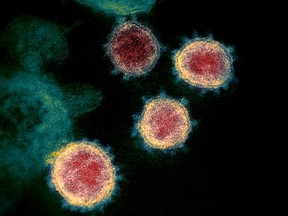How can we increase the probability of large-scale natural immunity?
Relaxing restrictions slowly, boosting testing, rapid contact tracing and quick reactions to infections are part of the equation, one expert says.

Article content
What is natural immunity and how does it occur?
Since mid-March, the Quebec government and public health officials have been scrutinizing the number of confirmed COVID-19 cases and the mortality rate. That won’t change.
But now the experts also want to know, six weeks into the battle, what proportion of the asymptomatic population was actually infected and is now naturally immune. That natural immunity will go a long way toward protecting the population at large until a vaccine is developed.
During Thursday’s pandemic briefing, Premier François Legault said the estimate is that less than 10 per cent of Quebec’s population is immune.
Infectious disease specialist Dr. Matthew Oughton said the larger the naturally immune cohort is, the better it can protect the vulnerable who will never be immune — he includes newborns and people who do not respond well to vaccines in the latter category. The bottom line is, the higher the immunity rate, the slower the spread.
So how do you increase the probability of large-scale natural immunity and how do you determine the scale of that immunity?
Part of the equation involves the slow but steady relaxation of restrictions, combined with as much testing as possible, rapid contact tracing and quick reaction to limit the spread if infection occurs.
The other part of the equation relies on random testing of the asymptomatic population.
That is done by using the nasal swab method or a serology kit (which tests the blood for signs of virus antibodies).
“You could random test in different ways,” Oughton said. “If one person in a family was infected, but the other three people in the house had no symptoms, they could be tested for antibodies. You could do the same thing at apartment building. The data collected would be hugely important.”
Oughton noted that herd immunity — another term being batted around these days — and natural immunity are closely related in concept. Herd immunity occurs when a sufficiently high proportion of the population becomes immune to a contagion, through either natural immunity or with the help of a vaccine. Since a COVID-19 vaccine does not yet exist, the focus is on creating the conditions for natural immunity to flourish.
If the relaxation of restrictions is done in a prudent fashion, Oughton said a significant portion of the population could potentially become naturally immune before a vaccine is approved.
“What we don’t know right now is what proportion of the population had no symptoms or very mild symptoms relative to the portion of the population with symptoms,” he said.
Oughton referred to one study that had been done in New York City — a hot spot of COVID-19 in the U.S. — which extrapolated that as much as 20 per cent of the population had been infected, but showed no symptoms. He said it wasn’t advisable to give too much weight to one study, but that the results were interesting.
“It suggests that the natural immunity hit 20 per cent in four months. If that percentage continues to grow over the next four months, that’s a huge natural immunity,” he said. “And if the immunity lasts a while, say one year, that would allow time for a vaccine to arrive.
“But at this point, we simply don’t have the long-term data. It’s hard to know how long a (natural) immunity will last when the virus has only been on our radar for four months.”
Note to readers: We know the speed and volume of coronavirus-related news is overwhelming and a little frightening. To help with that, we will dedicate a Montreal Gazette reporter each day to devote their time to synthesizing the most important coronavirus-related news, especially as it relates to life in Montreal and Quebec. Follow the updates for April 23 right here. All our coronavirus-related news can always be found here: montrealgazette.com/tag/coronavirus.
Sign up for our new email newsletter dedicated to local coronavirus coverage here: montrealgazette.com/coronavirusnews.







Postmedia is committed to maintaining a lively but civil forum for discussion. Please keep comments relevant and respectful. Comments may take up to an hour to appear on the site. You will receive an email if there is a reply to your comment, an update to a thread you follow or if a user you follow comments. Visit our Community Guidelines for more information.